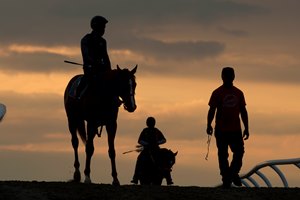First Trial in Federal Doping Case Delayed to January


Attorneys for three defendants named in a federal lawsuit alleging participation in a widespread scheme to distribute various misbranded and adulterated substances for the purpose of doping racehorses succeeded Sept. 15 in getting a trial date moved from November to mid-January.
U.S. District Judge Mary Kay Vyskocil agreed to the date change during a status conference hearing Wednesday that was a hybrid of in-court appearances, videoconferencing, and telephone conferencing. Conflicts with other trials and the challenges of sorting through a mountain of exhibits as part of the discovery process were presented as reasons for delaying the trial.
"In terms of preparation ... the government has not even stated that they completed discovery. They've said there isn't even a cutoff date at this point," argued Patrick Joyce, attorney for Jordan Fishman, who is accused of compounding performance-enhancing drugs to specifications supplied by veterinarian Seth Fishman.
"The expert notices were due 60 days prior to trial. We are within those 60 days already, so we would not be able to meet the standards the court has already set," Joyce continued. "As the court is aware, this is an extremely complicated case. I think all the defendants are out of town and will have to make arrangements to make their way to this courthouse."
Jordan Fishman, Seth Fishman, and Lisa Giannelli, who in court documents is accused of being a distributor of drugs to horse farms, are all scheduled to face trial together first among a total of 11 defendants.
Initially Judge Vyskocil was reluctant to delay the trial, noting her order in August that the first of four trial groupings for this case would be held during the fourth quarter. She also took offense to a letter from Joyce asking her to reschedule the trial when similar letters had not been sent to other judges involved with other cases that presented conflicts.
"This trial comes first chronologically," said the judge. "It is disrespectful to me."
Eventually, Vyskocil acknowledged that the defendants' counsel and the U.S. attorneys had agreed that all experts would be disclosed 60 days prior to trial and because that had not been done, a November trial was impossible.
"I am telling you now that the case is going to trial in the first quarter and I am requesting the earliest slot. I am not going to listen to 'something is backed up in front of another judge,'" said Vyskocil. The judge added that she would request a date around Jan. 15 so as to not interfere with the holidays, but noted that because the master calendar for the court has not been set yet, the attorneys needed to clear their calendars for all of January.
Defense attorneys were grateful for the additional time to review what one attorney estimated to be "thousands" of exhibits.
"I think I can speak for all of the defense counsel... and you have been already hearing it from us, the discovery—I cannot overstate how voluminous it is," said Rita Glavin, attorney for trainer Jason Servis, while addressing the judge. "We may have had something that we've had since September but because we were focusing on other parts of the discovery, we then discover a file is missing or there is something corrupted. This has been a real chore getting through it."
